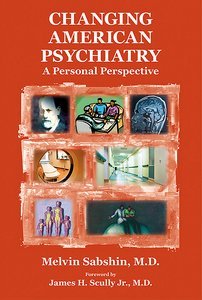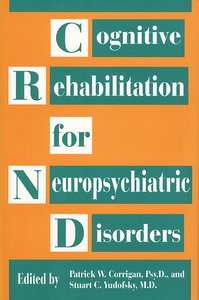Changing American Psychiatry
A Personal Perspective
View Pricing
Description
Psychiatrists, psychoanalysts, other mental health workers, behavioral scientists, and university medical and neuroscience professionals will benefit from this articulate insider's view of post-World War II psychiatry in Changing American Psychiatry: A Personal Perspective by Melvin Sabshin, M.D. Dr. Sabshin served as Medical Director of the American Psychiatric Association (APA) for 23 years, from 1974 to 1997, during a period of perhaps the greatest change in psychiatry since the World War II produced a dramatic modification of practice.
The author describes in detail two extraordinary periods of change, the first stimulated by laudatory efforts to understand the high rate of psychiatric casualties among World War II veterans and to provide treatment for them. Psychiatry grew quickly during the postwar years, considerably influenced by the immigration of many Central European psychoanalysts. Gradually, however, psychiatry began to weaken its ties to medicine and lost much of its public respect. By the 1970s, postwar optimism had been replaced by widespread concern that psychiatric practice was being dominated by unsubstantiated formulations rather than reliable evidence. Psychiatry was dramatically impacted by enormous pressure for therapeutic accountability exerted by a managed care reimbursement system. The profession recognized the need for a new direction and resolved to change.
In the foreword to the book, current APA Medical Director James H. Scully Jr., M.D., notes that Dr. Sabshin has woven a personal journey of the history of the intellectual conflicts and changes in the field of psychiatry in the post-war era, culminating in the remedicalization of psychiatry and the development of the DSM-III.
Dr. Sabshin encourages psychiatric professionals to change the field so it can employ an empirically based bio-psycho-social model that has the potential to revitalize the next phase of American psychiatry. He details how the potential for the future of psychiatry can be enhanced by today's practicing professionals, stressing the:
- Need to incorporate the rapid developments of neuroscience into a professional practice that is increasingly integrated with empirically demonstrated psychological and social influences upon mental illness.
- Importance on continued research that is fed back into practice and keeps the professional evidence-based.
- Need of psychoanalysis to make its beliefs explicit, formulating hypotheses that can be tested scientifically in order to be employed reliably in evidence-based practice.
This well-crafted historical account describes how the profession has become a more respected and accountable part of medicine and how it scientific credentials have risen as a result. Dr. Sabshin concludes that the use of psychological understanding and psychotherapies must play a major role combined with psychopharmacology in the treatment of psychiatric patients.
Contents
- List of Plates
- About the Author
- Foreword
- Introduction
- Acknowledgments
- Chapter 1. Post–World War II Scene in American Psychiatry
- Chapter 2. A Pathway to Psychiatry
- Chapter 3. Implicit Preparations for a Leadership Role in Psychiatry
- Chapter 4. Reflections During the Search
- Chapter 5. Clarifying the Mission
- Chapter 6. En Route to Equity
- Chapter 7. International Affairs
- Chapter 8. Psychoanalysis
- Chapter 9. Forensic Psychiatry
- Chapter 10. Evidence-Based Diagnosis and Treatment
- Chapter 11. Psychiatric Research
- Chapter 12. Psychiatric Education
- Chapter 13. A Changing Membership
- Chapter 14. Annual Meetings
- Chapter 15. Publications
- Chapter 16. Governance and Leadership
- Chapter 17. Management of External Relationships
- Chapter 18. Social and Community Psychiatry
- Chapter 19. Conclusions
- Appendixes:
- Appendix 1: Selected Papers
- Appendix 1A: Turning Points in Twentieth-Century American Psychiatry
- Appendix 1B: The Future of Psychiatry
- Appendix 2: American Psychiatric Association Speakers of Assembly of District Branches
- Appendix 3: Presidential Themes for American Psychiatric Association Annual Meetings, 1984–2008
- Appendix 4: Officers of the American Psychiatric Association
- Appendix 5: American Psychiatric Association Membership Figures, 1873–2007
- Appendix 6: Presidents of the American Psychiatric Association
- Appendix 7: American Psychiatric Association Organizational Chart, 2008 and 1986
- Appendix 8: American Psychiatric Association Joint Commission on Government Relations
- Appendix 9: Psychiatry Organizations of Interest
- Appendix 10: American Psychiatric Association Assembly Area Councils by Region
- Appendix 11: Comparison of American Psychiatric
- Association Area and District Branch Membership, 2002–2007
- Appendix 12: DSM Task Forces and Working Groups
- Appendix 13: American Psychiatric Association Medical Directors
- Appendix 14: American Psychiatric Association Governance System
- Index
About the Authors
Melvin Sabshin, M.D., was Medical Director of the American Psychiatric Association from 1974 to 1997. Dr. Sabshin studied medicine at Tulane University. After postgraduate training and a research post at Tulane's Department of Psychiatry, he received an appointment at the Michael Reese Hospital in Chicago, a center of psychiatric research and psychodynamically oriented practice, where he completed psychoanalytic training. In 1961 he was appointed Professor and Head of the Department of Psychiatry at the University of Illinois College of Medicine. Dr. Sabshin is an Honorary Fellow of the Royal College of Psychiatrists.
Related Products
Carousel Control - items will scroll by tabbing through them, otherwise arrows can be used to scroll one item at a time








